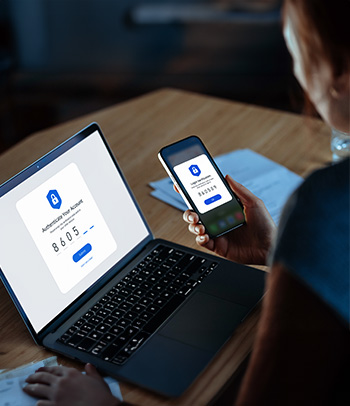The Federal Trade Commission estimates that in 2022 alone, Veterans reported $292 million in losses to fraud.
Maybe it has happened to you or someone you know. You get a call from someone pretending to be from a government agency requiring that you pay a fine. Or maybe you get an email from someone pretending to be affiliated with the Department of Veterans Affairs (VA) who wants your personal information to update your records. Or maybe you get a call from an organization that claims it can help you access more benefits for a small upfront fee.
Veterans are often the target of scams like these – scams that are explicitly designed to exploit your military service in an attempt to access your benefits or earnings. According to Disabled American Veterans, Veterans are twice as likely to unknowingly participate in a scam as the general population – with an estimated 16% of Veterans losing some money to fraud.
Learn more about scams targeting Veterans, warning signs to look out for and what steps you can take to protect yourself.
What Are Some Common Scams Targeting Veterans?
Scams against Veterans are on the rise, with scammers often using a Veteran’s military service and background as part of the scam. The Federal Trade Commission estimates that in 2022 alone, Veterans reported $292 million in losses to fraud.
Scammers may try to get your personal or financial information to defraud you or scam you out of money. Understanding the ways someone may specifically target you as a Veteran can help you avoid being scammed. Here are some examples:
- Someone may claim to be from VA and ask you to provide personal details to help you qualify for additional benefits.
- Someone may claim to have a discount or a deal exclusively for Veterans, like an easy way to finance a new car, a way to increase your benefits, a job offer that isn’t available anywhere else or a better deal on your home loan, and then ask for payment upfront to secure the deal.
- Someone may attempt to charge you for copies of your records or government forms, even though you can obtain copies for free from VA or the National Archives.
- Someone may say you qualify for a particular program or benefit, even naming something you know like the PACT Act or the Camp Lejeune settlement, and then demand a fee upfront or ask for personal information to file a claim on your behalf.
- Someone may claim to be from an organization or charity that works on behalf of Veterans and then ask for a donation.
What Are Some Red Flags or Signs of a Scam?
Scams can be hard to spot. But you can be on alert and stay one step ahead if you’re aware of some of the red flags and tactics used by scammers.
Scammers often:
- Ask for money or your personal information. A scammer may say you owe a fine that must be paid immediately, or there’s a virus on your computer that you have to pay to fix, or that there’s been a problem with one of your accounts and you need to verify it by providing your personal information.
- Use threats and pressure to ensure you act immediately. Scammers don’t want you to wait and think things through, so they will try to get immediate access to what they want, even making threats to sue you, arrest you or deport you.
- Call, text, email or reach out over social media, often pretending to be someone you trust. A scammer may claim to be someone from a government agency like VA, a Veterans’ advocacy group, a military-affiliated organization or a job recruiter in an attempt to gain your trust.
- Use financial incentives to lure you in. Someone may call to say you qualified for a grant, received a job offer or won a cash prize and they need your personal and financial information to get it to you.
- Use your personal information to make it appear that they know you. Hackers may find your information online or learn details from your social media accounts and use it to gain your trust. A scammer may know your first and last name, something about your service, your birthdate, and more details about your life.
- Insist on being paid in a specific way. Scammers often ask for payment in the form of cash, gift cards, cryptocurrency, a payment app or a wire transfer because these methods make it almost impossible to get your money back.
How Can I Protect Myself From a Scam?
- Avoid posting your personal information online. If you use social media, avoid using identifiable information that may be helpful to scammers such as your address, your birthdate, your workplace, etc.
- Reject communication from strangers on social media platforms. Avoid accepting friend requests or engaging in online conversations with people you don’t know. Scammers often use fake social media profiles to begin communication.

- Take advantage of privacy settings and security measures. Use privacy settings when you’re using social media to ensure your accounts are only visible to people you know and trust. In addition, make your passwords long and complex and use multi-factor authentication when it’s available. You should also download antivirus software on your devices to protect yourself from malware attacks.
- Screen all emails carefully. Don’t click on any links or open emails from senders you don’t know or trust. For example, a scammer may pretend to be your bank and ask you to click on a link to verify your account information in order to steal the information you enter.
- Ask for details from anyone who contacts you. If someone calls you claiming to be from a government agency or a military or Veteran-affiliated organization, ask for a name, a title and a callback number. You can use this information to try to verify their identity.
- Be aware of email addresses and websites that look suspicious. Scammers can create very realistic emails and websites, so analyze them carefully. Look for misspellings or poor grammar as a sign that the company or email isn’t real.
- Do your research. If you’ve received an offer for a job or a discount on a product, look up the company before believing it. If you’ve been offered help from an advocacy group, research the name and history of the company. You can type a company’s name in your search engine and add the word “complaint” or “scam” to see if anything turns up. If you think an email came from your bank or credit card company, don’t click on it and call the company instead to verify the communication.
- Never give out financial information to anyone who contacts you unexpectedly. Honest organizations won’t call, email or text you to ask for your personal information. Do not share information like your social security number, health care information or bank or credit card numbers with anyone you don’t know and trust.
- Talk to someone you trust. Many scammers want you to “act fast,” so be sure that you do the opposite. Don’t make decisions in a hurry. Instead, slow down and tell a friend or family member what’s going on. He or she may help you uncover a scam.
- Consider how you pay. Most credit cards have fraud protection built in, but some payment methods don’t, such as using cash, wiring money or using a reloadable gift card.
- Sign up for the Federal Trade Commission’s free scam alerts. Sign up to get the latest tips and advice on scams, including those targeting military consumers and Veterans.
- Report scams to the Federal Trade Commission. If you think you’ve been a victim of a scam or you’ve uncovered an attempted scam, report it to the Federal Trade Commission.
What Resources Are Available to Help?
- Military Consumer offers information and tools specific to Veterans and military members. Get email updates about the latest scams and learn more about protecting yourself from scammers.
- The Federal Trade Commission offers an easy way for you to report fraud, scams and bad business practices online or by calling 877-382-4357.
- VA has helplines to assist with scams and fraud as well.
- For reporting health care-related fraud, contact VA’s Office of Integrity and Compliance at 866-842-4357.
- For suspected VA benefits fraud, call VA’s Benefits Hotline at 800-827-1000.
- For suspected VA Identity Theft, call the helpline at 855-578-5492.
- The Better Business Bureau provides a Wise Giving Alliance tool, which allows you to check out charitable organizations prior to donating.
- VA provides a searchable database of attorneys, claims agents and Veterans Service Organizations so you can double-check the details of anyone who contacts you.
- VA has a fraud prevention toolkit designed to help protect Veterans from fraud and get help if it happens.
Keep one step ahead of the scammers! Stay up to date on new scams targeting Veterans and protect yourself and your information from fraud.







